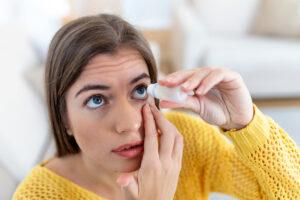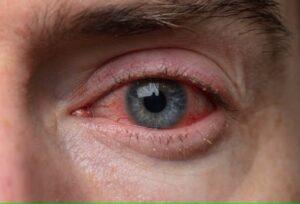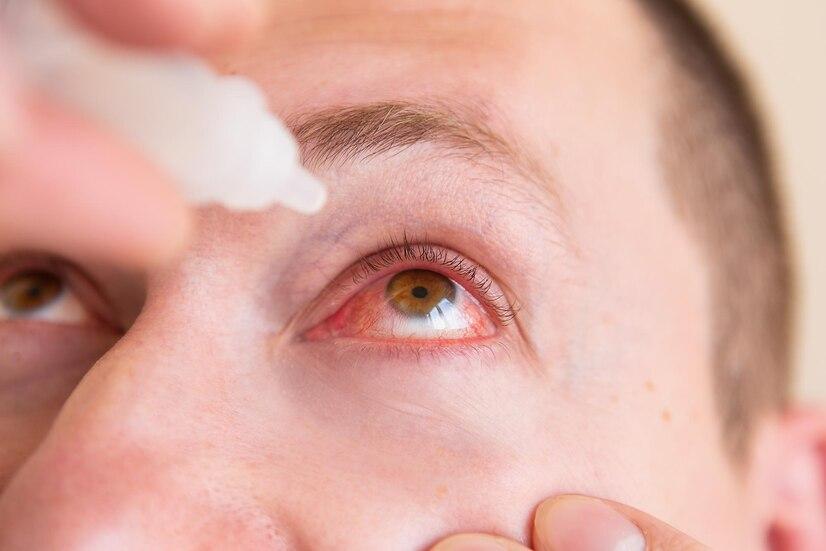Why Are My Eyes Burning Symptoms?
Eye burning symptoms is a common complaint that affects individuals of all ages. It can be minor to extremely painful, and it may also be accompanied by other eyes-burning symptoms. Understanding the causes and symptoms of eye burning is crucial in determining the underlying issue and seeking appropriate treatment. In this article, we will explore the various factors that can contribute to eye-burning symptoms and discuss possible remedies and preventive measures.

1) Causes of Eyes burning symptoms:
Eye burning can be caused by several factors, including environmental conditions, underlying medical conditions, and lifestyle habits. Environmental factors such as dry air, exposure to smoke, dust, or allergens can irritate the eyes and lead to a burning sensation. Prolonged exposure to screens or reading in poor lighting conditions can strain the eyes and cause discomfort.
Certain medical conditions can also contribute to eye burning. Dry eye syndrome, where the eyes do not produce enough tears or tears evaporate too quickly, is a common cause. Allergies, conjunctivitis (pink eye), blepharitis (inflammation of the eyelids), and corneal abrasions can also result in burning sensations in the eyes.
Additionally, lifestyle habits like excessive contact lens wear, improper use of eye cosmetics, and exposure to harsh chemicals can irritate the eyes burning symptoms, and lead to discomfort.
2) Symptoms:
Eye burning can manifest with various symptoms, including:
- Redness: The eyes might seem red or red.
- Dryness: A feeling of dryness or grittiness in the eyes is common.
- Watery eyes: Paradoxically, burning eyes may produce excessive tears.
- Itching: Eyes may feel itchy or irritated, leading to a desire to rub them.
- Sensitivity to light: Individuals with eye burning may find bright lights uncomfortable.

Blurred vision: In severe cases, vision may become blurry or distorted.
These side effects can essentially influence everyday exercises and personal satisfaction. It is important to note that eye burning may be accompanied by other signs of infection or inflammation, such as discharge, swelling, or pain. If these symptoms persist or worsen, it is advisable to consult an eye care professional for a thorough evaluation.
3) Allergies
Burning eyes are a common symptom of eye allergies, also known as allergic conjunctivitis. This condition occurs when your eyes come into contact with an allergen, such as pollen, dust, or pet dander. Your body responds to the allergen by releasing histamines, which cause inflammation and irritation in your eyes.
In addition to burning, other symptoms of eye allergies include:
- Redness
- Itching
- Tearing
- Swelling
- Sensitivity to light
There are a number of things you can do to relieve burning eyes from allergies, including:
- Take an over-the-counter antihistamine. This will help to reduce the amount of histamines released by your body, which will in turn help to reduce inflammation and irritation in your eyes.
- Use eye drops. There are a number of different types of eye drops that can help to relieve burning eyes from allergies. Some eye drops contain antihistamines, while others contain mast cell stabilizers. Mast cell stabilizers help to prevent your body from releasing histamines in the first place.
- Apply a cold compress to your eyes. This will aid in reducing pain and inflammation.
- Avoid your allergens. If you are aware of your allergens, make every effort to stay away from them. This may mean staying indoors on windy days, keeping your pets out of your bedroom, or changing your laundry detergent.
If your burning eyes are severe or do not improve with home treatment, see your doctor. They might suggest different forms of treatment or prescribe stronger medications.
4) Treatment and Prevention:
The treatment of eye burning depends on the underlying cause. In mild cases, simple self-care measures can provide relief. These include:
- Frequent blinking: Regularly blinking helps to moisten the eyes and reduce dryness.
- Lubricating eye drops: Artificial tears can alleviate dryness and provide temporary relief.
- Cold compress: Applying a cold compress over closed eyelids can soothe burning sensations.
- Avoiding irritants: Limit exposure to smoke, dust, allergens, and other known irritants.
- Taking breaks from screens: Regularly resting the eyes during prolonged screen use can reduce strain.
If eye burning persists or is associated with other symptoms, professional medical advice should be sought. An eye care specialist may recommend prescription eye drops to alleviate dryness or treat underlying conditions such as allergies or infections.

Preventive measures can also help manage eye-burning symptoms and reduce their occurrence:
- Maintain proper eye hygiene: Clean your eyelids and lashes daily with a gentle cleanser.
- Follow contact lens care guidelines: Clean and store contact lenses properly to avoid irritation.
- Take breaks and practice the 20-20-20 rule: Every 20 minutes, take a 20-second break and focus on something 20 feet away.
- Use protective eyewear: When engaging in activities that may expose the eyes to chemicals or debris, wear safety glasses or goggles.
- Keep eyes lubricated: Use artificial tears regularly
5) Analyzing:
The symptoms associated with eye-burning can provide insights into the underlying issues and help determine the appropriate course of action. Here are some key aspects to consider when analyzing eye-burning symptoms:
Intensity and Duration: Note the intensity of the burning sensation and how long it lasts. Mild, occasional burning may be attributed to temporary factors such as exposure to irritants or eye strain. On the other hand, persistent or severe burning may indicate an underlying medical condition that requires attention.
Accompanying Symptoms:
Pay attention to any accompanying symptoms that occur alongside eye burning. Common symptoms include redness, dryness, itching, watery eyes, sensitivity to light, and blurred vision. These additional symptoms can provide clues about the specific cause of eye burning, such as allergies, dry eye syndrome, or an eye infection.
Triggers or Patterns: Identify any patterns or triggers that worsen or alleviate the eye-burning symptoms. For instance, if eye burning is more pronounced after prolonged screen use or exposure to certain environments (e.g., smoke, dust, or allergens), it suggests environmental factors as potential contributors. Similarly, if symptoms improve with the use of lubricating eye drops or rest, it may indicate dryness or eye strain as the underlying cause.
6) Eye Appearance:
Observe the appearance of the eyes for any visible signs of inflammation, redness, swelling, discharge, or changes in the eyelids. These visual cues can provide valuable information about underlying conditions such as conjunctivitis, blepharitis, or corneal abrasions.

7) Impact on Daily Life:
Consider how eye-burning symptoms affect daily activities and quality of life. If the burning sensation interferes with work, reading, driving, or other tasks, it may necessitate prompt medical attention.
It is important to note that while mild eye-burning symptoms can often be managed with self-care measures, persistent or severe symptoms should prompt a visit to an eye care professional for a comprehensive evaluation. They can provide a proper diagnosis, recommend appropriate treatment options, and offer guidance on preventive measures to minimize future occurrences of eye burning.


1 thought on “Eyes burning symptoms”